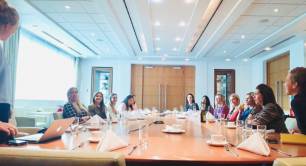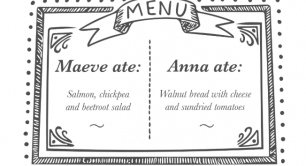What can social entrepreneurs learn from those who take to the streets?
NatWest and Pioneers Post are hosting a series of informal gatherings for our network of Women in Social Enterprise (WISE100) across the UK, and the second took place in Glasgow earlier this month. Over lunch, and following a provocation from Hey Girls founder Celia Hodson, the conversation moved from clear differentiations between campaigners and social entrepreneurs, to a recognition that we might have much learn from those who take to the street.
We’re living in an age of revived protest. Around the world, there’s a new level of organising the masses that trumps (pun intended) even the age of the suffragettes. In the US, a record 10 to 15 million people have protested in some form since Donald Trump was inaugurated in 2017.
Social entrepreneurs generally see themselves as the people that “get the job done” rather than as campaigners. But at a lunch in Glasgow hosted by NatWest and Pioneers Post, the conversation soon turned to a more nuanced understanding of campaigning.
“I was brought up in the Lake District. There was a marina in our town, and the animals were kept in really bad conditions. I decided I was going to work out how to free the dolphins!” said Celia Hodson, founder of Hey Girls, the social enterprise tackling period poverty.
During her provocation to 14 female leaders, she went on to describe how she and a group of friends marched on the streets with a blow-up dolphin. Hodson was later approached by a civil engineer who had been watching the protest. He pointed out places around that marina that he considered a safety risk – and said the way to free the animals was actually to get the unsafe buildings closed down.
Listen to Celia Hodson’s provocation in full below (which begins with her showing the group an unexpected award – a framed picture of herself):
That was a moment of realisation. When it comes to fighting your cause, there are “so many other, clever, ways to do things,” Hodson said; you just need to “think outside the box”.
And that’s exactly what she did. Thirty years ago, Hodson was living on the breadline; she was on benefits and borrowing money from doorstep lenders. Unable to afford period products for her two daughters, she decided to do something about it.
Translating messages
Hey Girls period products are now stocked in more than 300 supermarkets, have secured contracts to supply government bodies, and through their ‘buy one, give one’ model, have donated 5.6 million packs of products in the last 18 months. By thinking outside the box with their campaigns (quite literally), Hey Girls is tackling period poverty as well as broadening the audiences they reach, including men.
‘Sometimes I feel that our pitch is only pitched to us – people who understand what we’re talking about. Let’s translate that to normal folk’
But getting your message out to the right people is not easy. Deborah Grant is a performance advisor at Inspiring Scotland, a venture philanthropy organisation. Her organisation hasn’t always quite hit the mark with its social media, Grant said. She spoke about the lessons learned from this, and told the group that “unless we have a powerful story that people can relate to personally, perhaps we should… make the message about the change we want to make.” And, she added, it can be easy to speak to your own bubble and think the job is done: “As social enterprises, we’ve spent a lot of time mixing with each other, supporting each other. Sometimes I feel that our pitch is only pitched to us – people who understand what we’re talking about. Let’s translate that to normal folk.”
And translating complex messages to ‘normal folk’ is precisely what traditional campaigning is all about. Creating catchy slogans, memorable taglines and repeated messages helps to truly hammer home a point (and ultimately may lead to change).
Pauline Graham is CEO of Social Firms Scotland, an intermediary that gives a voice to Scottish social enterprises that challenge barriers to employment. Her role, she said, is all about campaigning and public awareness: “As an intermediary it’s important to understand your members’ issues and the sector messages well enough in order to support them, to try to influence and shape policy.” Social Firms Scotland tailors its messages to help a variety of audiences understand the enterprises they represent. “We’re campaigning on their behalf,” said Graham.
‘They celebrate every tiny milestone. They celebrate everything that any of them does as a collective win’
Hodson’s business seems to have got it spot on when it comes to the right message for the right audience. Its latest success: the car sales company Autotrader in Manchester has recently started stocking Hey Girls products. For an office of 500, mostly men, this is quite an achievement – not to mention a way for companies in male-dominated industries to show they’re welcoming to more women employees.
So perhaps the lessons to be learned from ‘campaigning’ are less about organising the masses, and more about knowing how to get the right message out to the right people. And for Hodson, the most important lesson for entrepreneurs can learn from long-time campaigners is about camaraderie: “They work as a group... They celebrate every tiny milestone. They celebrate everything that any of them does as a collective win. That’s something that we need to learn.”
Find more interviews, features and business insights from leading women in social enterprise in our WISE100 collection.
Header photo by Niels Jilderda on Pexels.



